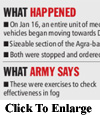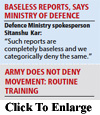This is a story you would tell with extreme care and caution. But it
so starkly characterises the current state of top-level
politico-military relations that it is a folly to keep it under wraps,
as the entire establishment has tried to do for a full 11 weeks now.

It has also taken this team of The Indian Express reporters that
long to establish the story and the dramatic developments during, say,
about 18 very difficult hours on January 16-17 earlier this year.
While many, including the spokesmen for the defence
establishment, say it was much ado about nothing (see box), it is a
story of a most unusual night when Raisina Hill was spooked as never
before in peace time.

Essentially, late on the night of January 16 (the day Army Chief
General V K Singh approached the Supreme Court on his date of birth
issue), central intelligence agencies reported an unexpected (and
non-notified) movement by a key military unit, from the mechanised
infantry based in Hisar (Haryana) as a part of the 33rd Armoured
Division (which is a part of 1 Corps, a strike formation based in
Mathura and commanded by Lt Gen. A K Singh) in the direction of the
capital, 150 km away.
Any suspicion was still considered much too implausible, but
lookouts were alerted as a routine step. This was part of a protocol put
in place in June 1984 when some mutineers from Sikh units had moved
towards the capital in the wake of Operation Bluestar.
The lookouts confirmed the movement of what looked like a
sizeable unit. It was soon identified as an entire unit of Mechanised
Infantry, with its Russian-made Armoured Fighting Vehicles (AFVs),
carried on 48 tank transporters. The movement was towards the capital,
which was odd.
No such thing had been notified. The Army Day celebrations had ended just the previous day (January 15).
It was still a cause for curiosity and some confusion — more than
much concern — because, over the decades, New Delhi has come to be
totally relaxed and trustful of the apolitical and professionally
correct nature of its military leadership.
The situation changed rapidly, though. Reports came in of yet
another military movement “towards” Delhi. This unit was identified as a
large element of the airborne 50 Para Brigade based at Agra.
The lookouts were activated south of Delhi as well and the column was identified.
By this time, both columns were being tracked and “watched”. A
bemused establishment raised an alert of sorts. The Defence Minister was
informed. Immediately, the Centre put in motion an old contingency plan
to delay just such a move.
It issued a terror alert with instructions to police to carefully
check all vehicles on the highways leading to Delhi. The objective was
to slow down traffic. The Prime Minister was informed at the crack of
dawn on January 17. Quiet checks carried out on the location and status
of key formations and their commanders, particularly in the northwestern
region, revealed nothing abnormal at all. Defence Secretary Shashi Kant
Sharma was asked to cut short his visit to Malaysia. He returned.
After the briefing, he opened his office late at night and asked
Lt Gen. A K Choudhary, Director General Military Operations, to see him
and explain what was going on. Gen. Choudhary, it seems, knew about the
move of the Paras (the Para Brigade is controlled directly by the DGMO)
and said it was a routine exercise.
He was asked to return with full facts about the mechanised unit.
This he did soon enough. The explanation was still the same: the Army
was carrying out exercises to check its ability to make quick
deployments of key units during fog. He was told to send the units back
immediately. Both formations were halted, and sent back within hours.
The mechanised unit, sources said, had parked itself at an
industrial park near Bahadurgarh abutting West Delhi’s Najafgarh. The
Paras were staying put in the barracks of an artillery regiment — 79
Medium —not far from Palam.
The Army's explanation that it was all a simple fog-time exercise
was then viewed with scepticism at the highest level. The question: Why
was the well-set protocol, that any military movement, at any time, in
the NCR (National Capital Region) has to be pre-notified to MoD
(Ministry of Defence) not followed?
The Army’s justification for the specific movements did sound
plausible though. The mechanised units, they said, were checking out
their ability to move and deploy rapidly in fog, should a contingency
arrive. It could not have driven westwards (towards Ferozepur or
Fazilka) as that would have alarmed Pakistan since the move had not been
notified to them.
There was a more elaborate explanation for the paratroopers’
movement. The mandated time for the Agra-based Paras to get airborne in
an emergency is just two hours. It was simpler when they were
transported by aircraft based “in situ”, at the same military complex in
Agra.
The new designated transport for them is the faster, bigger and
brand new C-130J Hercules. The IAF has based the C-130s at Hindon,
across the Yamuna, east of Delhi. Since fog lifts in Agra much later
(11.30 am) than at Hindon (8.30 am) in January, the Army was checking
out the possibility of transporting the paratroopers to Hindon by road
to “marry” them with the C-130s, rather than wait for the planes to land
at Agra, and thereby save time.
In the process, the Army said, they discovered many glitches.
These are now being ironed out. For example, it was found that the
shoulder-fired missiles, standard equipment with Para units, were stored
not in Agra, as decided several years earlier, but at Bharatpur as was
the case originally.
So the columns were delayed by that detour and the stop at
Bharatpur to pick up their missiles, and thereby also forced to take a
longer route to Delhi. The good lesson learnt: all of the Paras’
equipment must now be based where their home is, at Agra.
But this was questioned too. Did the mechanised units have to
come as far as the outskirts of Delhi to check out their readiness? And
Hindon is a long distance from Palam/Gurgaon. Even on a reasonable day,
an Army convoy might take longer moving from here to Hindon given the
snarls on Outer Ring Road and NH-24, than if only it had crossed the
Yamuna at Agra itself and driven through Uttar Pradesh, parallel to GT
Road. Why was the IAF not informed of this exercise? Again, the Army’s
explanation is they did not want to hold an elaborate exercise involving
the IAF etc, or cause alarm.
The government also noted the fact that the C-130s were not even
in Hindon then. They were in Jaisalmer, rehearsing at their staging base
for the Republic Day flypast. Yet another reason some in the government
were curious was that between Army Day (January 15), and Republic Day
(January 26), when so many Army units are involved in parades, such
exercises are rare, particularly around the capital.
The Indian Express has had detailed conversations with key people
and sources at the very top of the political, civil and military
leadership. There is unanimity over General V K Singh’s impeccable
reputation as a sound, professional soldier, earned over nearly 42 years
of distinguished service to the Army. Nobody is using the “C” word to
imply anything other than “curious”. All else is considered an
impossibility.
But so strained has the political-military relationship been
these weeks, that nothing is easily dismissed as a routine misdemeanour.
The timing — the Chief’s petition on his date of birth was filed on the
morning of January 16 — did not help.
Sources speak of confusion and unease in the government. To be
fair, the MoD’s considered view now seems to be that it was a false
alarm, caused by some non-adherence to Standard Operating Procedures
(SoPs) by the Army and an alarmist civil/political reaction on a
particularly distrustful day.
We learn, however, as a consequence, that certain “important
correctives” have been put in place. Incidentally, the Home Ministry has
turned down the Army Headquarters’ recommendation (subsequent to the
events of January 16/17) to appoint Lt Gen. Choudhary as D-G Assam
Rifles, the paramilitary force it controls.
These are the bare facts of an unusual set of events. It is too
early to answer all the ‘hows, whys and the what-nexts’ of this. Or to
say whether it was an avoidable case of neurosis the Indian
establishment is — mercifully — not familiar with.
These facts may indeed be officially denied for now. But these
will be debated for a long time, forcing the UPA to introspect on its
mismanagement of the delicate civil-military relationship, bruised as it
is now by charges of corruption, bribes and bribe offers and
indiscipline. These will also have a bearing on the future course of
higher defence organisation and control in India.
(Ajmer Singh contributed to this report)
What Happened
* On Jan 16, an entire unit of mechanised infantry based in Hisar
with its fighting vehicles began moving towards Delhi. It parked near
Najafgarh
* Sizeable section of the Agra-based 50 Para Brigade also moved to near Palam
* Both were stopped and ordered to be moved back
What Army says
* These were exercises to check effectiveness in fog
* Troops moved towards Delhi, not outward, westward since Pakistan hadn’t been notified
* The Paras were being moved to check out possibility of their “marrying” with the C-130s in Hindon
Unanswered questions
* Why wasn’t Ministry of Defence notified?
* Did the units have to come so far towards Delhi?
* Why was the IAF not informed?
Baseless reports, says Ministry of Defence
Defence Ministry spokesperson Sitanshu Kar:
“Such reports are completely baseless and we categorically deny the same.”
Army does not deny movement: Routine training
Maj Gen S L Narasimhan, Additional Director General, Public
Information, did not deny the movements, but said these were routine.
“These were routine training at the formation-level to check the
effectiveness of mobilisation as per Standard Operating Procedure of
local formations. Almost all units of the Army carry out a number of
such training at different times of the year.”
* Asked if mobilisation from the two cantonments were authorised,
Narasimhan said: “Such routine training does not need authorisation.”
* Why were the troops suddenly called back? “Once the
effectiveness of the mobilisation was checked, the troops were called
back as per Standard Operating Procedure.”
* When was the last time that troops were moved on this scale?
“Even formation-level (higher than this scale) mobilisation practices
are carried out routinely.”
* Asked if the Ministry of Defence sought written reports from
the commanders, Narasimhan said: “No such explanation has been asked by
the MoD.”
Courtesy:
http://www.indianexpress.com/news/the-january-night-raisina-hill-was-spooked-two-key-army-units-moved-towards-delhi-without-notifying-govt/932328/0



 At this point we must remember that being
capable is one thing and looking capable is quite another. The BJP looks capable
of governance, but is not, while the Congress Party does not look capable, but
is certainly more capable than the BJP. However, it does not look the
part.
At this point we must remember that being
capable is one thing and looking capable is quite another. The BJP looks capable
of governance, but is not, while the Congress Party does not look capable, but
is certainly more capable than the BJP. However, it does not look the
part.
 g
g










